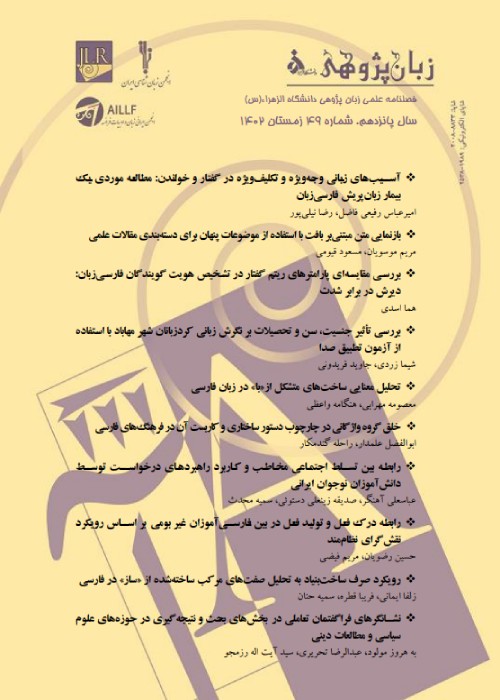A Cognitive Analysis of the Concepts of “Divine Anger and worldly Punishment” in the Holy Quran
There are many verses in the Holy Qur'an that are related to God’s wrath toward man. The frequency of these verses which are presented in different grammatical forms and meanings implies the importance of this divine message which is to be transferred to the human. Undoubtedly, God’s wrath is quite different from human anger in nature. However, a man knows the concepts that he has experienced himself and this includes emotions like anger. According to cognitive linguists, metaphor is a way of converting abstract concepts (namely the source domains) to concrete concepts (namely the target domains). This study seeks to answer the following questions:1.How does the concept of divine anger is conceptualized in the Holy Quran? 2.What are the target domains? 3.What are the differences between the prototype scenario in God and a man? The theoretical framework used in this study is Kovecses’s (1986) theory of human anger. His model includes a list of source domains that are mapped onto the target domain of anger as well as the scenario of anger. The source domains are: A) “anger is fire/heat” as the central metaphor. The major metaphors are: B) Anger is insanity. C) Anger is a dangerous animal. D) Anger is an opponent (in a struggle). E) Anger is a burden. F) Anger is trespassing. More metaphors are “existence are pressure” and “body is the container of feeling”. The scenario of anger which is called “prototype scenario” include the following stages:an offending event, anger, control, loss of control, an act of retribution.
Cognitive linguistics was introduced by the publication of the book “Metaphors We Live by” by Lakoff and Johnson in the '80s. This approach made fundamental changes in the study and analysis of metaphor that has remained unchanged since Aristotle. The new approach quickly replaced the classic one and it soon attracted many researchers. The term ‘conceptual metaphor’ is well known among Iranian researchers and a significant number of works can be found in this area. As an illustration, Hooshagi & Seyfiporgu (2009) studied the most frequent source domains in the Holy Quran and listed them. Ghaeminiya (2009) also analyzes the conceptual metaphors used in the Holy Quran, believing that cognitive theory has an impact on understanding the Qur'anic verses. Pourebrahim (2009) lists the types of conceptual metaphors in the first half of the Qur'an (15 parts).Veysi & Ouraki (2015) analyze metaphorical structures in the holy Quran. They believe that the cognitive approach is capable of analyzing verbal metaphors. Finally, Andalibi (2006) focuses on the meta-metaphor of " Man as the Servant of God" and studies the relationship between ‘God’ and ‘Man’ in the metaphoric terms.
The present study is qualitative and descriptive-analytic research. To investigate how the concept of anger is conceptualized in the Holy Quran, the verses in which the concept of anger was expressed metaphorically were first extracted and then were examined regarding the source domains as well as the prototype scenario. Our aim was to identify the familiar and understandable concepts ( to man) which are used in the Quran. The target domains were found in the conceptualization of divine anger in Qur'an were: fire, damage and destruction (disease, natural disaster, and destruction), animals, space (excommunication, damn and sealing the heart) and darkness. The target domains used in Qur'an show that although divine anger is quite different from human anger, conceptualization is done in a way that makes it easy and understandable for the human beings. Moreover, the stages of anger for God are different from the stages of anger in man. The divine scenario of anger consists of the following three stages: ‘Guidance’ is the first stage in which God shows the right path to the people through the prophets and the Holy Scriptures. ‘Warning’ is the next step. In the Holy Quran, there are many verses that prohibit man from committing certain sins, such as disbelief and lies. The last stage is divine retribution in which God prescribes definite retributions for the sinners.
- حق عضویت دریافتی صرف حمایت از نشریات عضو و نگهداری، تکمیل و توسعه مگیران میشود.
- پرداخت حق اشتراک و دانلود مقالات اجازه بازنشر آن در سایر رسانههای چاپی و دیجیتال را به کاربر نمیدهد.



